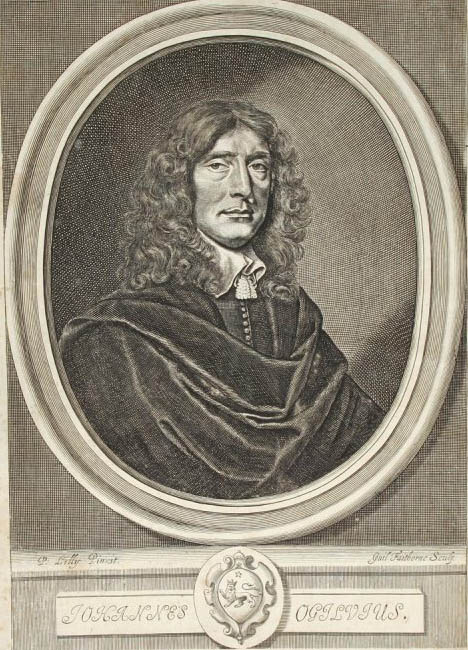“Suffer thou with patience this delay.”
The Works of Publius Virgilius Maro (2nd ed. 1654), Virgil's Æneis
John Ogilby war ein schottischer Tänzer, Tanzmeister, Impresario, Übersetzer klassischer Epen und Fabeln, Dichter, Buchhändler, Verleger, sowie königlicher Zeremonienmeister, Buchdrucker und Kosmograph.
Ogilbys frühe Karriere als Tänzer endete bereits 1621, als er einen Unfall erlitt und von diesem Zeitpunkt an auf einem Bein lahm war. Danach kam Ogilby nach Irland, wo ihn der englische Statthalter Thomas Wentworth als Tanzmeister und Schreiber engagierte. Er gründete mit dem Werburgh Street Theatre Dublins erstes Theater und war von 1638 an als Master of the Revels für die Vergabe von Lizenzen für Masques und Theateraufführungen in Irland zuständig.
Nach Ausbruch des Bürgerkriegs in England 1641 wurde sein Gönner Wentworth auf dem Schafott hingerichtet und das Schauspielhaus in Dublin geschlossen. Daraufhin kehrte Ogilby nach England zurück, lernte Latein und Griechisch und übersetzte Vergil, Äsop und Homer ins Englische. Mit den Aesopicks, einer auf den Fabeln Äsops basierenden und durch eigene Geschichten erweiterten satirischen Verserzählung, kritisierte Ogilby die politischen und gesellschaftlichen Zustände in England.
Seine Werke ließ Ogilby von Künstlern wie Wenzel Hollar oder Francis Cleyn illustrieren. Durch ästhetisch aufwendig gestaltete Ausgaben erwarb er sich ein Renommee, das ihm unter anderem den Auftrag verschaffte, den Krönungsfestzug Karls II. durch die Londoner City im Jahr 1661 in einem Prachtband zu dokumentieren . Als Verleger gehörte Ogilby zu den Pionieren der Subskription im englischen Verlagsgeschäft des 17. Jahrhunderts.
Im Jahr 1671 gründete Ogilby eine eigene Druckerei und konzentrierte sich auf die Herausgabe geographischer Werke. Am bekanntesten wurde der 1675 veröffentlichte Atlas Britannia. Mit seiner spezifischen Art der Darstellung bestimmte Ogilbys Britannia Straßenpläne bis weit ins 18. Jahrhundert und gilt heute als Meilenstein in der Entwicklung von Straßenatlanten.
Wikipedia

“Suffer thou with patience this delay.”
The Works of Publius Virgilius Maro (2nd ed. 1654), Virgil's Æneis
“This cruel Prince that made his Will a Law.”
Fab. XII: Of the Frogs desiring a King
The Fables of Aesop (2nd ed. 1668)
“But who art thou? that Voyce, and beauteous Face,
Not Mortal is; thou art of Heavenly Race.”
The Works of Publius Virgilius Maro (2nd ed. 1654), Virgil's Æneis
The Works of Publius Virgilius Maro (2nd ed. 1654), Virgil's Georgicks
The Works of Publius Virgilius Maro (2nd ed. 1654), Virgil's Æneis
The Works of Publius Virgilius Maro (2nd ed. 1654), Virgil's Æneis
“Britany, from all the World disjoyn'd.”
The Works of Publius Virgilius Maro (2nd ed. 1654), Virgil's Bucolicks
“They say the Deity
Is mix'd through Earth, the Sea, and lofty Skie.”
The Works of Publius Virgilius Maro (2nd ed. 1654), Virgil's Georgicks
“Robber of Man, who now shall give thee ayd?”
Fab. VI: The Battel of the Frog and Mouse, line 136
The Fables of Aesop (2nd ed. 1668)
“Pray for wet Summers, Winters wanting Rain.”
The Works of Publius Virgilius Maro (2nd ed. 1654), Virgil's Georgicks
“But them I'm not so foolish to believe.”
The Works of Publius Virgilius Maro (2nd ed. 1654), Virgil's Bucolicks
“Fury our Judgement charms,
And we conceive it brave to dye in Arms.”
The Works of Publius Virgilius Maro (2nd ed. 1654), Virgil's Æneis
“Taught by my Woes, to succour the distrest.”
The Works of Publius Virgilius Maro (2nd ed. 1654), Virgil's Æneis
“Having drown'd her sparkling Eyes in tears.”
The Works of Publius Virgilius Maro (2nd ed. 1654), Virgil's Æneis
“And could'st thou hope, perfidious, to deceive
Me thus? and secretly our Kingdom leave?”
The Works of Publius Virgilius Maro (2nd ed. 1654), Virgil's Æneis
“None can Protect themselves with their own Shade.
None for themselves are born.”
Fab. XLVII: Of the Rebellion of the Hands and Feet
The Fables of Aesop (2nd ed. 1668)
“No Beast is half so False as Man.”
Fab. XLIX: Of the Fox and the Cock
The Fables of Aesop (2nd ed. 1668)
“Mean time the Queen wounded with deep desire,
Bleeds inward, and consumes in hidden Fire.”
The Works of Publius Virgilius Maro (2nd ed. 1654), Virgil's Æneis
“Ah! who may hope, when Heaven hath Help deni'd!”
The Works of Publius Virgilius Maro (2nd ed. 1654), Virgil's Æneis
The Works of Publius Virgilius Maro (2nd ed. 1654), Virgil's Æneis
Book I. Compare Pope's translation:
: The spear receiving from her hand, he plac'd
Against a column, fair with sculpture grac'd;
Where seemly rang'd in peaceful order stood
Ulysses' arms, now long disus'd to blood.
Homer His Odysses Translated (1665)
The Works of Publius Virgilius Maro (2nd ed. 1654), Virgil's Æneis
“Various Arts by study might be wrought
Up to their height.”
The Works of Publius Virgilius Maro (2nd ed. 1654), Virgil's Georgicks
“Dear Friends, for we have many Dangers past,
And greater, God these too will end at last.”
The Works of Publius Virgilius Maro (2nd ed. 1654), Virgil's Æneis
“May you live happy, you whose Woes are done.
Stern Fates, to Fates more cruel, us constrain.”
The Works of Publius Virgilius Maro (2nd ed. 1654), Virgil's Æneis
“Great things to compare with Small.”
The Works of Publius Virgilius Maro (2nd ed. 1654), Virgil's Bucolicks
Variante: If I may great things compare with Small.
“Happy is he that hidden causes knowes.”
The Works of Publius Virgilius Maro (2nd ed. 1654), Virgil's Georgicks
“Love Conquers all, let us submit to Love.”
The Works of Publius Virgilius Maro (2nd ed. 1654), Virgil's Bucolicks
“Sweet Youth, in Colour no such trust repose.”
The Works of Publius Virgilius Maro (2nd ed. 1654), Virgil's Bucolicks
“How could my Son so highly thee incense
What was the wasted Trojans great offence?”
Compare John Dryden's translation:
How could my pious son thy pow'r incense?
Or what, alas! is vanish'd Troy's offense?
The Works of Publius Virgilius Maro (2nd ed. 1654), Virgil's Æneis